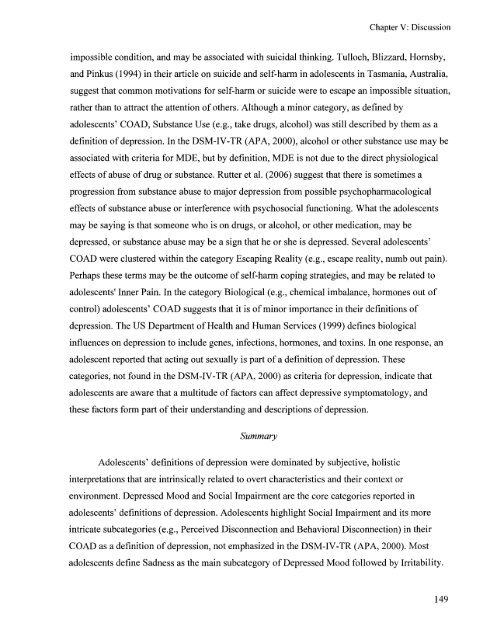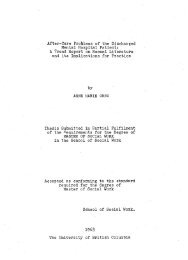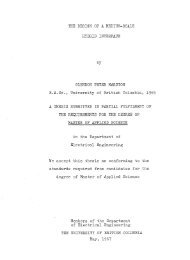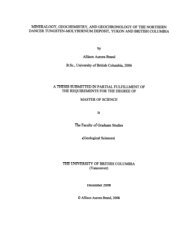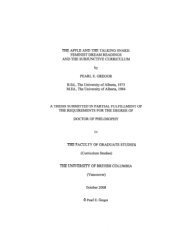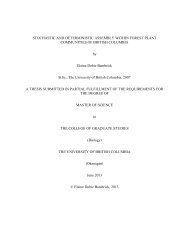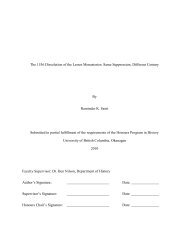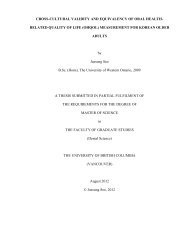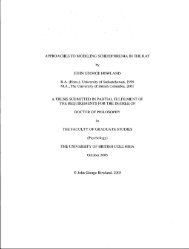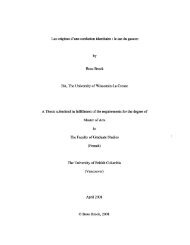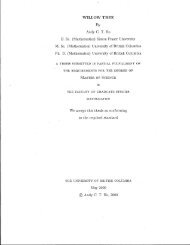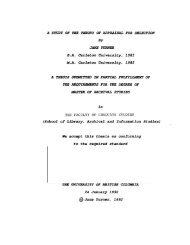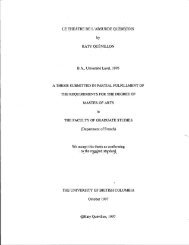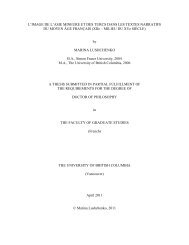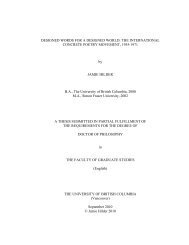how do adolescents define depression? - cIRcle - University of ...
how do adolescents define depression? - cIRcle - University of ...
how do adolescents define depression? - cIRcle - University of ...
Create successful ePaper yourself
Turn your PDF publications into a flip-book with our unique Google optimized e-Paper software.
Chapter V: Discussion<br />
impossible condition, and may be associated with suicidal thinking. Tulloch, Blizzard, Hornsby,<br />
and Pinkus (1994) in their article on suicide and self-harm in a<strong>do</strong>lescents in Tasmania, Australia,<br />
suggest that common motivations for self-harm or suicide were to escape an impossible situation,<br />
rather than to attract the attention <strong>of</strong> others. Although a minor category, as <strong>define</strong>d by<br />
a<strong>do</strong>lescents' COAD, Substance Use (e.g., take drugs, alcohol) was still described by them as a<br />
definition <strong>of</strong> <strong>depression</strong>. In the DSM-IV-TR (APA, 2000), alcohol or other substance use may be<br />
associated with criteria for MDE, but by definition, MDE is not due to the direct physiological<br />
effects <strong>of</strong> abuse <strong>of</strong> drug or substance. Rutter et al. (2006) suggest that there is sometimes a<br />
progression from substance abuse to major <strong>depression</strong> from possible psychopharmacological<br />
effects <strong>of</strong> substance abuse or interference with psychosocial functioning. What the a<strong>do</strong>lescents<br />
may be saying is that someone who is on drugs, or alcohol, or other medication, may be<br />
depressed, or substance abuse may be a sign that he or she is depressed. Several a<strong>do</strong>lescents'<br />
COAD were clustered within the category Escaping Reality (e.g., escape reality, numb out pain).<br />
Perhaps these terms may be the outcome <strong>of</strong> self-harm coping strategies, and may be related to<br />
a<strong>do</strong>lescents' Inner Pain. In the category Biological (e.g., chemical imbalance, hormones out <strong>of</strong><br />
control) a<strong>do</strong>lescents' COAD suggests that it is <strong>of</strong> minor importance in their definitions <strong>of</strong><br />
<strong>depression</strong>. The US Department <strong>of</strong> Health and Human Services (1999) <strong>define</strong>s biological<br />
influences on <strong>depression</strong> to include genes, infections, hormones, and toxins. In one response, an<br />
a<strong>do</strong>lescent reported that acting out sexually is part <strong>of</strong> a definition <strong>of</strong> <strong>depression</strong>. These<br />
categories, not found in the DSM-IV-TR (APA, 2000) as criteria for <strong>depression</strong>, indicate that<br />
a<strong>do</strong>lescents are aware that a multitude <strong>of</strong> factors can affect depressive symptomatology, and<br />
these factors form part <strong>of</strong> their understanding and descriptions <strong>of</strong> <strong>depression</strong>.<br />
Summary<br />
A<strong>do</strong>lescents' definitions <strong>of</strong> <strong>depression</strong> were <strong>do</strong>minated by subjective, holistic<br />
interpretations that are intrinsically related to overt characteristics and their context or<br />
environment. Depressed Mood and Social Impairment are the core categories reported in<br />
a<strong>do</strong>lescents' definitions <strong>of</strong> <strong>depression</strong>. A<strong>do</strong>lescents highlight Social Impairment and its more<br />
intricate subcategories (e.g., Perceived Disconnection and Behavioral Disconnection) in their<br />
COAD as a definition <strong>of</strong> <strong>depression</strong>, not emphasized in the DSM-IV-TR (APA, 2000). Most<br />
a<strong>do</strong>lescents <strong>define</strong> Sadness as the main subcategory <strong>of</strong> Depressed Mood followed by Irritability.<br />
149


